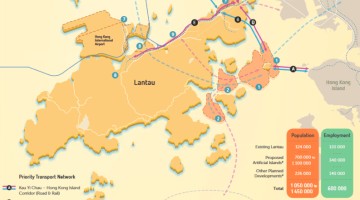Sir / Madam,
As the HK government requests funding for a feasibility study into the Lantau Tomorrow Vision, you only touch on why it is so unpopular with many residents of Hong Kong (“Phew, no democrats” 5 December 2020).
As an expert in infrastructure finance and a long – term resident, let me add some further perspective.
HK is chronically short of land with perhaps 150,000 flats needed in the short / medium term – but the LTV won’t address this shortage because it will take 15 years to build. The short – term needs can instead be addressed more quickly and more cheaply by building on brownfield land in the New Territories, scrapping the small – house policy there, loosening planning restrictions, resuming land not needed by the People’s Liberation Army and more.
The long-term justification for the LTV is questionable anyway. The plan dates back to a very different era, 1980. Today, HK’s population is forecast to rise from its current 7.5 million to a peak of 8.2 million in 2043. With a fertility rate for residents of only 1.36, this increase and more is due entirely to an assumed inward migration, mostly from the Mainland. But this assumption is inconsistent with the Greater Bay Area initiative which is designed to integrate HK with Guangdong province and thus reduce the economic incentive for residents of the latter to move to the former. There are also fundamental design issues such as will it be a third CBD or affordable housing?
A task force on land supply reported in 2018 but included only a much less ambitious version of the LTV (1,000 hectares instead of 1,700) so it is not clear how much due diligence has been conducted on this larger version. In the two years since then, the estimated cost, whether borne by the government or somehow shared with the private sector, has already increased from HK$500 billion / US$64 billion to HK$625 billion / US$80 billion; given past experience of major projects in HK and elsewhere, this cost is likely to increase further. The feasibility study will need to consider whether this represents best use of taxpayers’ money.
The bill currently under consideration proposes that HK$550 m / US$71 m be spent on the feasibility study.It is to be hoped that these arguments will be addressed in that study – and that it is remembered that feasibility studies are permitted to conclude: don’t do it.







